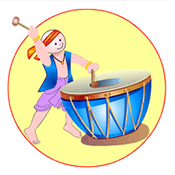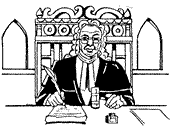
Dimdima
Online Children's Magazine from India

Dimdima
Online Children's Magazine from India
| Father of Indian Unrest |
|
|
Both the nationalistic movement and the revolutionary
movement which shook the country out of its centuries- old
slumber drew inspiration from Tilak's writings and utterances. Aurobindo Ghosh
and Bipin Chandra Pal in Bengal, Lala Lajpat Rai in Punjab, Chidambaram Pillai
and Subramania Bharati in the South, instituted nationalistic movements in
their provinces.
old
slumber drew inspiration from Tilak's writings and utterances. Aurobindo Ghosh
and Bipin Chandra Pal in Bengal, Lala Lajpat Rai in Punjab, Chidambaram Pillai
and Subramania Bharati in the South, instituted nationalistic movements in
their provinces.
Aurobindo described Nationalism as immortal. "Nationalism is not a trick of
intellect," said Aurobindo." It is an attitude of the heart, of the soul. What
intellect could not do, this mighty force of passionate conviction born out of
the very depth of the national consciousness, will be able to accomplish."
The Nationalists distanced themselves from European liberals. Wrote Bipin
Chandra Pal : "The time has come when in the interests of truth and civic
advancement and freedom of the people, our British friends should be distinctly
told that while we are thankful to them for all the kind things they have said
all these years for us, and the ready sacrifices they have made to make our lot
easy and their yoke light, we cannot any longer suffice to be guided by them in
our efforts for political progress and emancipation. Their view-point is not
ours." With this statement the nationalists cut the umbilical cord which
connected the Indian political movement with the European liberals.
The Revolutionaries comprising young Indians also drew inspiration from Tilak.
In 1897, when Rand, the plague commissioner of Pune was killed by the Chaphekar
brothers, the Anglo-Indian press screamed for Tilak's blood and Tilak was
arrested on charges of sedition. While the judge agreed that there was no
connection between Rand's killing and Tilak's writings, he ruled that Tilak's
writings showed absence of affection for the government. The judge concluded
that the absence of affection meant hatred against the government.
The whole country followed Tilak's trial with bated breath. The Hindu reported:
"From the early hours of the morning to late in the evening, crowds of people
stood outside the offices of the Hindu, anxiously awaiting the latest news
about Tilak. And when the telegram that he had been sentenced to 18 months'
imprisonment was read out, oh, what grief, what anguish was seen on the faces
around."
In a spontaneous reaction, mill workers struck work, shops downed shutters,
students walked out of classrooms and the country saluted the man who had
refused to apologize to the government, hailing him as "Lokamanya".
R.C. Majumdar sums up the mood of the time in this passage:
"The trial and conviction of Tilak may be regarded as a landmark in the history
of nationalism. Henceforth, sacrifice and sufferings in the cause of the
country, rather than eloquence and debating skill, came to be regarded as the
badge of honour and distinction. The martyrs replaced mere orators as
acknowledged champions of Liberty".
Dimdima is the Sanskrit word for ‘drumbeat’. In olden days, victory in battle was heralded by the beat of drums or any important news to be conveyed to the people used to be accompanied with drumbeats.
Bharatiya Vidya Bhavan
K. M Munshi Marg,
Chowpatty, Mumbai - 400 007
email : editor@dimdima.com
Bharatiya Vidya Bhavan
505, Sane Guruji Marg,
Tardeo, Mumbai - 400 034
email : promo@dimdima.com
Dimdima.com, the Children's Website of Bharatiya Vidya Bhavan launched in 2000 and came out with a Printed version of Dimdima Magazine in 2004. At present the Printed Version have more than 35,000 subscribers from India and Abroad.